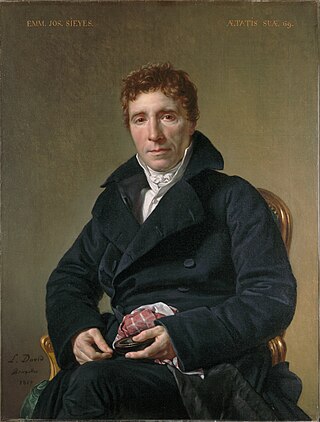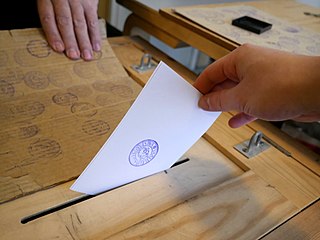
The president of France, officially the president of the French Republic, is the executive head of state of France, and the commander-in-chief of the French Armed Forces. As the presidency is the supreme magistracy of the country, the position is the highest office in France. The powers, functions and duties of prior presidential offices, in addition to their relation with the prime minister and government of France, have over time differed with the various constitutional documents since the Second Republic.
An electoral college is a set of electors who are selected to elect a candidate to particular offices. Often these represent different organizations, political parties or entities, with each organization, political party or entity represented by a particular number of electors or with votes weighted in a particular way.

Emmanuel Joseph Sieyès, usually known as the Abbé Sieyès, was a French Roman Catholic abbé, clergyman, and political writer who was the chief political theorist of the French Revolution (1789–1799); he also held offices in the governments of the French Consulate (1799–1804) and the First French Empire (1804–1815). His pamphlet What Is the Third Estate? (1789) became the political manifesto of the Revolution, which facilitated transforming the Estates-General into the National Assembly, in June 1789. He was offered and refused an office in the French Directory (1795–1799). After becoming a director in 1799, Sieyès was among the instigators of the Coup of 18 Brumaire, which installed Napoleon Bonaparte in power.

The National Assembly is the lower house of the bicameral French Parliament under the Fifth Republic, the upper house being the Senate. The National Assembly's legislators are known as députés, meaning "delegate" or "envoy" in English; etymologically, it is a cognate of the English word deputy, which is the standard term for legislators in many parliamentary systems).

A presidential election is the election of any head of state whose official title is President.

France is a unitary semi-presidential republic with a bicameral legislature. Public officials in the legislative and executive branches are either elected by the citizens or appointed by elected officials. Referendums may also be called to consult the French citizenry directly on a particular question, especially one which concerns amendment to the Constitution.

The Senate is one of the two chambers of the bicameral Federal Parliament of Belgium, the other being the Chamber of Representatives. It is considered to be the "upper house" of the Federal Parliament. Created in 1831 as a chamber fully equal to the Chamber of Representatives, it has undergone several reforms in the past, most notably in 1993 and 2014. The 2014 elections were the first without a direct election of senators. Instead, the new Senate is composed of members of community and regional parliaments and co-opted members. It is a chamber of the communities and regions and serves as a platform for discussion and reflection about matters between these federated entities. The Senate today plays a minor role in the federal legislative process. However, the Senate, together with the Chamber, has full competence for the Constitution and legislation on the organization and functioning of the Federal State and the federated entities. Since the reform of 2014, it holds about ten plenary sessions a year.

Elections in Benin take place within the framework of a multi-party democracy and a presidential system. Both the President and the National Assembly are directly elected by voters, with elections organised by the Autonomous National Electoral Commission (CENA).

Elections in Gabon take place within the framework of a presidential multi-party democracy with the Gabonese Democratic Party, in power since independence, as the dominant party. The President and National Assembly are directly elected, whilst the Senate is indirectly elected.

Elections in Niger take place within the framework of a semi-presidential system. The President and National Assembly are elected by the public, with elections organised by the Independent National Electoral Commission (CENI).

Elections in Togo take place within the framework of a presidential system. Both the President and the National Assembly are directly elected by voters. Togo is a one party dominant state with the Union for the Republic in power.

The National Assembly is the unicameral legislative house of the Parliament of Mauritania. The legislature currently has 176 members, elected for five-year terms in electoral districts or nationwide proportional lists.

The Puducherry Legislative Assembly is the unicameral legislature of the Indian union territory (UT) of Puducherry, which comprises four districts: Puducherry, Karaikal, Mahé and Yanam. Out of eight union territories of India, only three have legislatures and they are Delhi, Puducherry and Jammu and Kashmir. After delimitation shortly after its formation, the Puducherry legislative assembly has 33 seats, of which 5 are reserved for candidates from scheduled castes and 3 members are nominated by the Government of India. 30 out of 33 Members are elected directly by the people on the basis of universal adult franchise and the remaining three are nominated by the central government. These nominated members enjoy same powers as elected members of the assembly.

A referendum on the method of the election of the president was held in France on 28 October 1962. The question was whether to have the President of the French Republic elected by direct popular vote, rather than by an electoral college. It was approved by 62.3% of voters with a 77.0% turnout. The reform was controversial because it strengthened the executive at the expense of Parliament, and because of the disputed constitutionality of the procedure used.
Elections to the French National Assembly were held in Gabon and Moyen Congo as part of the wider French elections election on 10 November 1946.
Elections to the National Assembly of France were held in Algeria on 17 June 1951. Algeria had 30 of the 625 at the National Assembly.
Elections to the French National Assembly were held in Chad and Ubangi-Shari on 17 June 1951. The territories elected four seats to the Assembly via two electoral colleges; the first college spanned both territories and elected one seat, whilst Chad elected two seats via the second college and Ubangi-Shari one. René Malbrant was re-elected from the first college, and Barthélémy Boganda from the second in Ubangi-Shari. In the second college in Chad, both seats were won by the Chadian Democratic Union.

Representative Assembly elections were held in French Togoland on 8 December 1946.

The president of France is elected every five years.













